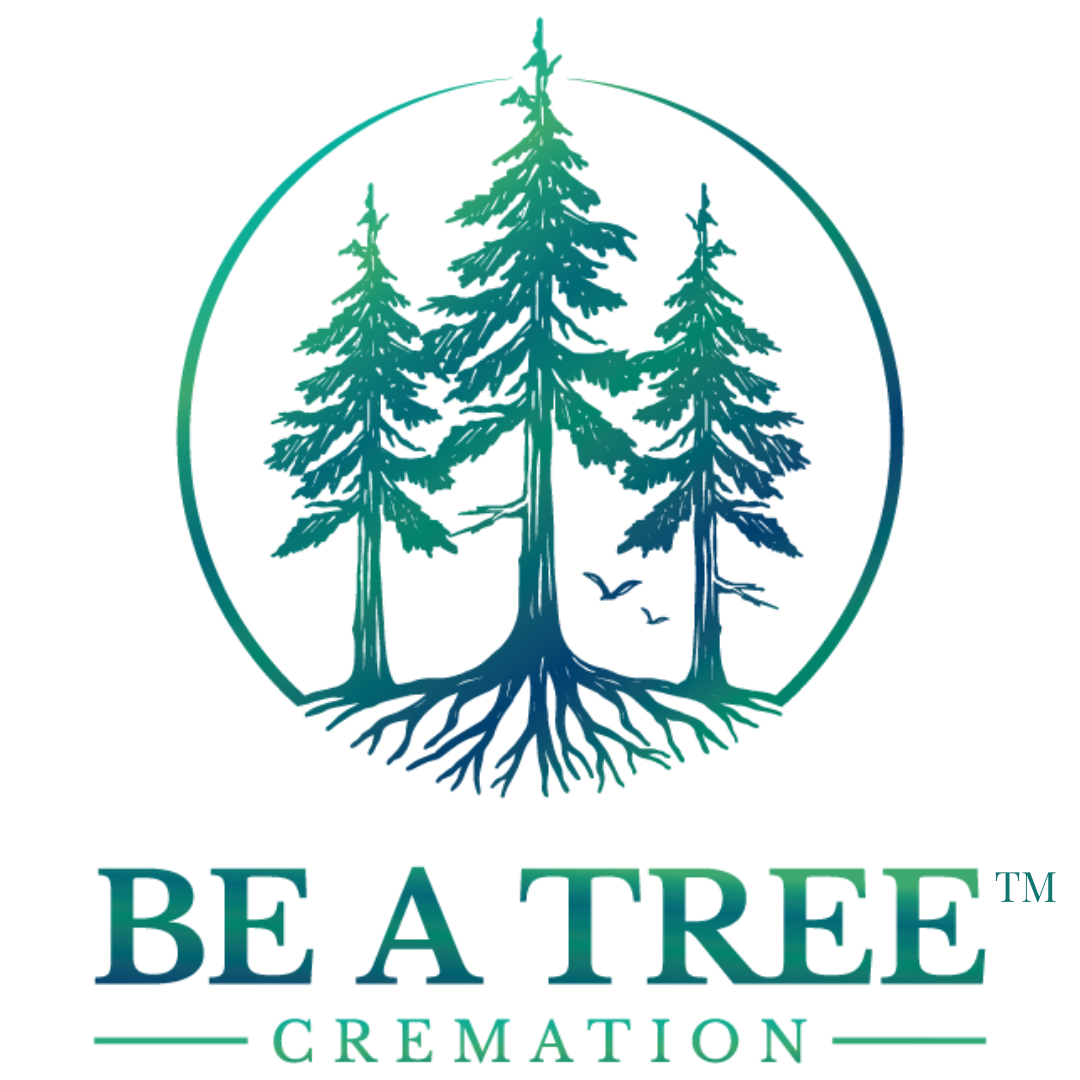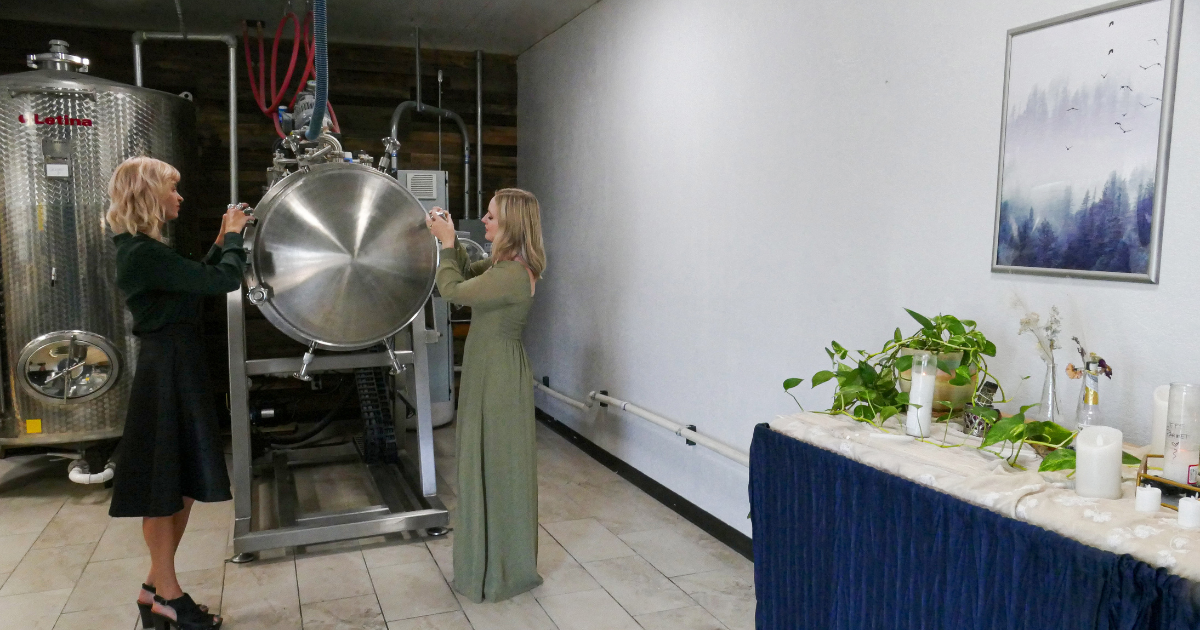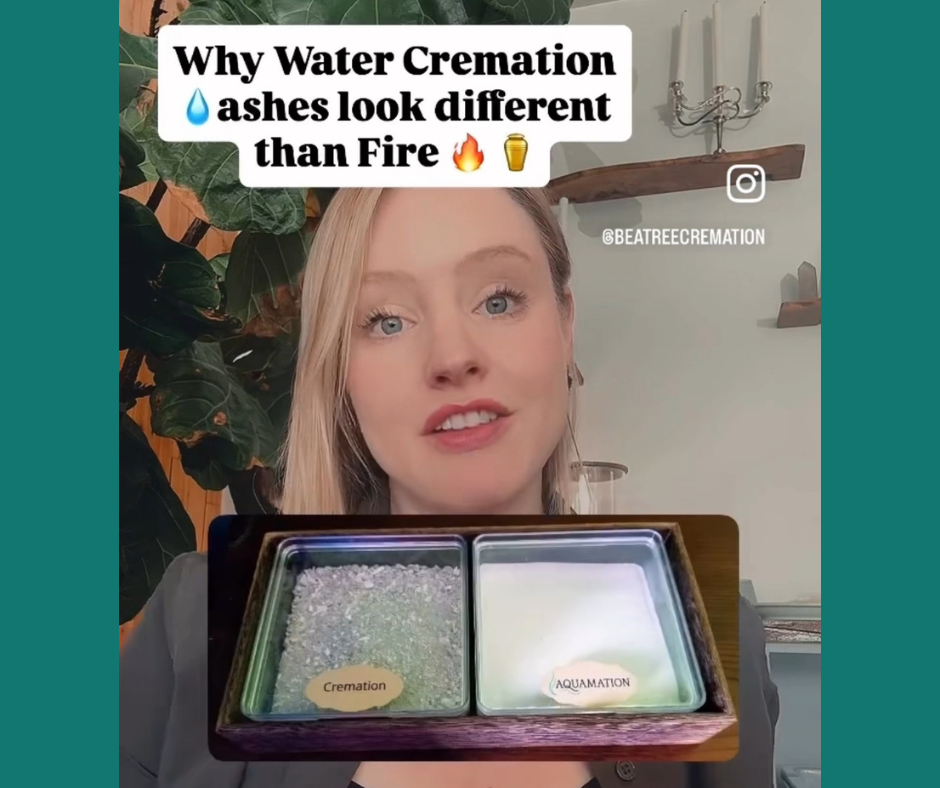
Water Cremation
in Denver, Colorado & Beyond
Water Cremation is a Gentle Path Back to the Earth
Water cremation, also known as aquamation or alkaline hydrolysis, offers a gentle path back to the earth that honors the sacred cycle of life and renewal. This compassionate process uses warm water, alkalinity, and time to return the body to its essential elements.
What remains are the pure mineral bones, which are returned to families as a fine, white powder, lighter in color than traditional cremation remains.
This water-based farewell requires 90% less energy than flame cremation and releases no emissions into our shared sky. It is a choice that speaks to our deepest understanding of interconnection - that in death, as in life, we remain part of the flowing, breathing, ever-renewing community of earth and water, air and time.
Helpful Videos on Water Cremation & Working with Be a Tree
What Do You Get Back From Water Cremation?
-

Urn with Cremated Remains
The skeletal remains left from Water Cremation are returned in a biodegradable bamboo urn.
-

Tree Tea™
You may keep some of the water left for use in your own garden or house plants.
-

Parting Stones
Cremated remains may also be returned as stones. Learn more about Parting Stone.
Giving Back to Nature
We are proud to partner with several key organizations and individuals to give Tree Tea™ back to the land in a responsible manner.









Why Water Cremation?
A single fire cremation is similar to driving from Denver to Salt Lake City*.
Using 90% less energy**, Water Cremation is the clear environmental choice.
*Source: Matthews Environmental Solutions as stated in National Geographic & EPA Emissions Calculator.
**Source: Bio Response Solutions
Fire Cremation vs. Water Cremation
Low-Cost Cremation
❌ C02 Intensive
❌ Ashes Returned in Plastic Box
❌ No Chance to View Loved One
❌ Third-Party Crematory
❌ Hidden Fees
❌ Poor Communication
❌ No Follow-Up Care
Be a Tree Cremation
✅ 90% Less Energy*
✅ Biodegradable Bamboo Urn
✅ Spend Time with Loved One
✅ On-Site Water Cremation
✅ Transparent Pricing
✅ Clear Communication
✅ Compassionate Follow-Up
*Source: Bio Response Solutions
How Does Water Cremation Work?
Mimicking Nature’s Process
Water cremation, also known as alkaline hydrolysis or aquamation, is a gentle process that uses 95% water and 5% lye (potassium hydroxide) combined with heat to mimic the natural decomposition process.
What’s Left After Water Cremation?
Everything except skeletal remains and implants is gently dissolved into a nontoxic liquid solution of amino acids, peptides, sugars, and soap, with no DNA remaining. We call this liquid Tree Tea™.
The skeletal remains are air-dried, processed, and returned in an urn similar to the “ashes” from a fire cremation. Artifical implants are recovered and recycled.
How Long Does Water Cremation Take?
The process is about 18 hours in total. This means we care for one loved one per day giving our full attention to that individual and their family.
Where Does the Water Go?
The Tree Tea™ is donated to various land partnerships such as The Wild Animal Sanctuary, Evergreen Memorial Park, and more. It can even be returned to private property.
How Much Does Water Cremation Cost?
We believe in transparent pricing and providing comprehensive, personal care.
Our full-service Water Cremation package starts at $3,920
See Pricing & Packages >
Service Area for Water Cremation
We serve families all over the state of Colorado. Transportation within 30 miles of Be a Tree Cremation is included in all packages and is $2.80 per mile outside of that radius.
Out-of-state transportation is available and quoted upon need. See pricing & packages >
What Families Are Saying
Where is Water Cremation Legal?
-
Legalized in Alabama in 2017
Statute added alkaline hydrolysis to its definition of cremation
-
No legislation passed
-
Legalized in Arizona in 2020
HB 2179
-
No legislation passed
-
Legalized in 2017 in California
7611.9 of the California Business and Professions Code went into effect in 2020
-
Legalized in 2011 in Colorado
Colorado Statutes § 12-54-102 changed the definition of cremation
-
Passed in 2026
Senate Bill No. 142
-
No legislation passed
-
Legalized in 2010
Florida Statutes § 497.005 expanded the definition of “cremation”
-
Legalized in 2012
Ga. Code Ann. 43-18-1 changed the state’s definition of cremation
-
Legalized in 2022
HB 1894 signed into law
-
Legalized in 2014
Senate Commerce & Human Resources Committee amended the Rules of the State Board of Morticians
-
Legalized in 2012
410 ILCS § 18/5 changed the state’s definition of cremation to include the process
-
-
No legislation passed
-
Legalized in 2011
Kansas Statutes § 65-1760 expanded its definition of cremation to include other methods than just “direct exposure to intense heat and flame”
-
21RS HB 346 is pending
-
No Legislation passed
-
Legalized in Maine in 2009
Attorney General approved a new definition of cremation in the Maine Rules for Establishment and Operation of Crematoria
-
Legalized in Maryland in 2010
Maryland Business Regulation Code § 5-101 changed the definition of cremation to include processes other than heat and flame
-
Bill S.1391 is under consideration
-
No Legislation passed
-
Legalized in Minnesota in 2003
Process was given licensing regulations and requirements
-
No legislation passed
-
20 CSR 2120-2.071 considers a legal final disposition method as it falls within the state’s definition of “cremation”
-
No legislation passed
-
No legislation passed
-
Legalized in Nevada in 2017
Assembly Bill 205 included a definition of alkaline hydrolysis
-
Legalized in New Hampshire in 2006 and repealed in 2008. 2013 bill failed
-
No legislation passed
-
No legislation passed
-
No legislation passed
-
Legalized in 2018
N.C. Gen. Stat. § 90-210.136
-
House Bill 1294 was proposed in 2017
Status is unknown
-
No legislation passed
-
No laws or regulations about alkaline hydrolysis
-
Legalized in 2009
Oregon Revised Statutes § 692.010(4) changed its definition of “final disposition” to include the dissolution of human remains
-
Senate Bill 810 is under consideration
-
No legislation passed
-
No legislation passed
-
No legislation passed
-
Legalized in 2021
Tennessee SB931
-
Senate Bill 105 is under consideration
-
Legalized in 2018
H.B. 121
-
Legalized in 2014
26 V.S.A. 21 § 1211
-
Legalized in 2023
Senate Bill 1487
-
Legalized in 2020
RCW 68.50.110
-
No legislation passed
-
Legalized in 2022
-
-
Legalized in 2014
Wyoming Statutes § 33-16-502 changed the Funeral Services Practitioners Act in 2014 to include “chemical disposition”




















No one likes to think about death — their own or a loved one’s. But planning ahead is one of the most profound gifts you can leave for your family. When a death occurs, there are countless decisions to make and important papers to locate. Having the right documents prepared and organized in advance can bring tremendous peace of mind to your family during an emotionally difficult time.